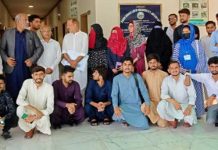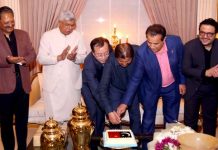KARACHI: The solar power is the way forward for Pakistan to safeguard its energy security and to lower the basket price of electricity for the consumers in the country, says a Press release.
This was stated by CEO of Alternative Energy Development Board (AEDB) Dr Rana Abdul Jabbar Khan in his keynote address at the 1st Virtual Conference on Solarization of Pakistan organized by the Energy Update.
The AEDB CEO said that Pakistan should massively take advantage of its presence in one of the best solar zones in the world.
He said that lately solar energy had become the cheapest source of energy among the low-cost options to generate electricity. This has happened due to steep decline in solar electricity rates.
He said that the AEDB would fully support the full exploitation of the solar power potential of the country so that by the year 2030 Pakistan would be generating up to 30 per cent of its electricity on the basis of clean sources of energy.
He said the AEDB had been conducting solar resource mapping of Pakistan with the support of World Bank as for the purpose nine solar stations had been established in different areas.
He said that the AEDB had also been adopting the required measures to introduce the regime of competitive bidding for upcoming alternative energy projects in the country.
Dr Khan said that the AEDB was fully committed to promote all clean resources of energy to pursue the new Alternative Energy Policy of the country.
He said that the solar power projects would also be introduced for the faraway off-grid areas of the country.
He said that the AEDB had also been promoting net-metering system to allow individual consumers to utilize wind and solar energy.
Also speaking on the occasion, Zaigham Mahmood Rizvi, chairman of PM Housing Task Force, emphasised the need of using superior quality equipment to generate solar electricity for the long-term benefit of the energy sector.
He said that the solar equipment of superior quality could last up to 40 years for maximum benefit of the energy system.
He said that quite soon export-oriented industries had to install alternative energy projects as their products manufactured through conventional sources of energy would not be accepted by the developed countries.
He said that India had done much home work to switch its industries to the option of clean resources of energy.
He said the utilization of the clean energy resources had a massive impact on environment and carbon footprint of the country.
Mehfooz Qazi, Director Sindh Solar Energy Project, said that the Sindh government had been working on the US$ 100 million project to extensively promote the use of solar energy in the province.
He said that Sindh had the potential to generate up to 10 GWs of electricity on the basis of solar power as such clean source of energy was enough to make the province self-sufficient in its electricity needs.
He said that the project initiated with the support of World Bank envisaged setting up of solar parks, utilization of the rooftops of the government buildings for installing solar projects, and solar energy solutions for the off-grid areas.
He hoped that the new Alternative Energy Policy of the government would be helpful in implementing World Bank-assisted solar project in Sindh.
Senior energy consultant FaizBhutta said that the commercial banks in the country should be encouraged to launch loan facility for upcoming clean energy projects.
Amin M Lakhani, Director of Clean Energy Project USAID (SEP), said that the government would ensure financial closure of upcoming renewable energy projects on urgent basis so that more clean electricity was available for the national grid.
Muhammad Ali Khan, Power Minister of Gilgit-Baltistan, said that the government of Gilgit-Baltistan had launched the initial study to assess the wind and solar power potential of the area.
He said that it was highly unfortunate that the GB had the potential of generating up to 55,000 MWs electricity on the basis of its hydro resource but despite this the region had been facing serious challenges in fulfilling its energy needs.
He said that the GB region required a clear-cut power policy as like other parts of the country so that it could tap its massive hydro resource not just for its own needs but also for the rest of Pakistan.
Naeem Qureshi, chairman of organizing committee of the conference, said that the Energy Update would continue to host more such roundtable sessions to assemble the energy experts from all over the country for the promotion of renewable energy resources.
Shaaf Mehboob, CEO Adaptive Technologies, M. Zakir Ali, CEO Inverex Solar Energy, Waseem Qureshi, CEO Infusion Group UAE, Waqas Idrees, Senior Energy Specialist USAID (SEP), Waqas Moosa, CEO Hadron Solar, Zafar Iqbal, Representative Pakistan Solar Association, Chairman IEEEP Irfan Ahmed, Anila Fatima, GM IT, Communication & Power FWO, Nida Hameed Khan, Senior Product Manager-Green Financing JS Bank, Energy Practitioner Gul Hasan Bhutto & others also addressed on the occasion.
Dr Rana Abdul Jabbar Khan’s keynote address at 1st Virtual Conference on Solarizations of Pakistan organised by Energy Update
Sign in
Welcome! Log into your account
Forgot your password? Get help
Password recovery
Recover your password
A password will be e-mailed to you.



